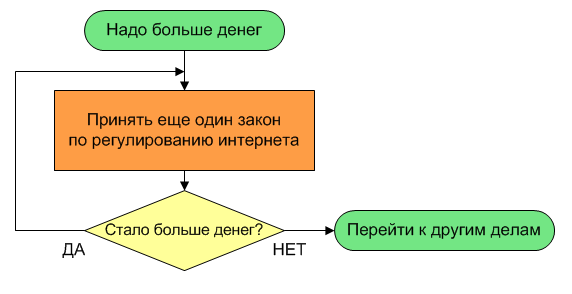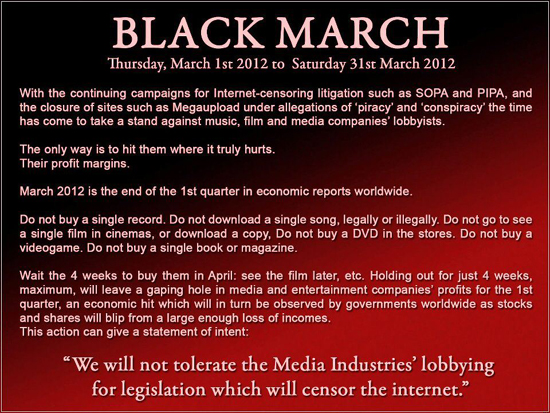Algorithm action lobby owners

Now, when there is an active discussion of the “anti-piracy” law, one of the main questions is how to make public opinion listen, not like last time . Creating a forum for discussion is certainly a very positive thing, but we must act in all directions. It is necessary that the society is not just listened, but reckoned with it .
The algorithm of action of the lobby holders in the matter of regulating the Internet, it seems to me, is very simple (it is shown in the figure). They will seek the adoption of new laws as long as it gives an economic effect. Sites, IP addresses, protocols, encryption - anything will be blocked and banned, despite any protests and calls for reasonableness, if the result is an increase in the amount of money in the pockets of the right holders.
')
The negative consequences of such laws have been discussed many times, I will not repeat. To be heard, we must make sure that the amount of money they have at least not increased, and even better - decreased.
To do this, it is necessary to boycott media production, which will be affected in the laws being passed - as long as these are films, then maybe books, music, games, programs. For a while, or indefinitely, until the situation changes: not to buy CDs, not to go to the cinema, not to pay for Internet services, and so on. Of course, not everyone will take part, but there are quite a few people concerned about the problem, and if they support the action, the effect is likely to be.
The advantages of such a protest:
- it is completely legal, we have every right not to buy;
- it is not dangerous, do not go to rallies that the police can disperse, or fear that after signing the petition the names will be blacklisted;
- anyone can do this, because in fact nothing needs to be done.
It is necessary to disseminate information about this action as widely as possible so that, on the one hand, the effect is stronger, and on the other hand, that right holders know that this is a protest against inappropriate legislative actions, and not just a decline in sales.
A similar action was organized in the USA in 2012 during the movement against SOPA, it was called “Black March”, then the initiative was supported in other countries. The call was formulated in this way: “we are against censorship on the Internet and blocking websites, so do not buy movies, music, games, books”. Unfortunately, I did not manage to find information whether there was an economic effect, but we know the result of the struggle against SOPA as a whole - it did not pass.

Where during the action to take films and everything else, if not to buy them? I do not call to download them illegally, let everyone decide for himself, because you can watch the old ones already in the collection, take them from friends, at least you can watch, sorry, TV. In any case, everything will depend on which variant of protest to elect:
1. The boycott of all products of media producers (with the exception of natural crowdfunding, direct transfers to independent authors and other similar things).
2. Boycott products and services of individual companies that are most actively in favor of new laws.
3. The boycott of individual products (movies, TV shows, etc.) that have already been used in blocking under the new law, since their list has been published.
Of course, maybe I'm wrong, and it will not work, but I think we should try, it will not be worse for sure.
Source: https://habr.com/ru/post/195430/
All Articles